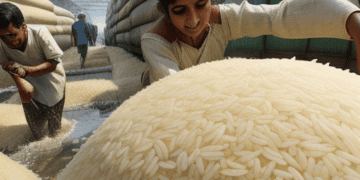In July, following a series of international events including Russia’s withdrawal from the Black Sea grain deal, India imposed a ban on the export of non-basmati white rice. This decision, taken for domestic reasons such as rising food prices, high inflation, and concerns over potential rice shortages due to El Nino, is having widespread global repercussions.
India, as the world’s largest rice exporter, plays a significant role in the global rice market. In 2022, the country was responsible for nearly 40% of the global rice trade, exporting 22 million tonnes valued at $9.66 billion to 140 countries. Despite continuing to export parboiled and basmati rice, the ban on non-basmati white rice has led to a 15-25% increase in global rice prices.
Countries that heavily rely on Indian white rice, such as Bangladesh and Nepal, along with African nations like Benin, Senegal, Togo, and Mali that import broken rice, are severely affected. This situation is compounded by the rise in international grain prices due to Russia’s conflict with Ukraine and the suspension of the Black Sea Grain Initiative.
There is also concern that other major rice-exporting countries like Thailand, Vietnam, and Pakistan, which collectively account for 30% of global rice sales, might impose similar restrictions in response to El Nino’s effects. Such actions could potentially lead to a shortage of rice, a staple food for more than half of the world’s population, and cause a domino effect on the demand and prices of other food items and even fuel.
In India, the ban aims to stabilize domestic rice prices, which have risen more than 10% in the past year. The government has announced plans to release 2.5 million tonnes of rice into the open market to control prices, especially in the context of upcoming state and national elections.
The export ban has led to panic buying in countries with large Indian expatriate communities, such as the United States, Canada, and various Middle Eastern, North African, and Asian countries. In Vietnam, rice prices have hit a 15-year high, and Nepal has seen a 16% increase since the ban. Both Nepal and the Philippines have indicated intentions to request rice shipments from India.
Although the ban includes provisions for government-to-government exports for humanitarian reasons, experts suggest that the quantities involved are small and the process lengthy.
Concerns about El Nino’s impact on rice crops in Asia, where 90% of the world’s rice is produced, are growing. Climate patterns like El Nino can lead to significant weather disruptions, affecting rice production and potentially prompting other rice-exporting countries to consider export restrictions. This could result in scenarios similar to the 2007-2008 crisis when rice prices tripled following export bans by several Asian countries.
Get the latest supply chain report news insights at The Supply Chain Report. For international trade resources, visit ADAMftd.com.
#IndiaRiceExportBan #GlobalRiceMarket #FoodPrices #ElNinoImpact #RussiaUkraineConflict #BlackSeaGrainDeal #RiceShortage #InternationalRicePrices #RiceExportRestrictions #IndiaAgriculture #BangladeshRiceShortage #NepalRicePrices #VietnamRicePrices #PakistanRiceExports #ThailandRiceMarket #AfricanRiceImports #GlobalFoodCrisis #SupplyChainDisruptions #RiceTrade #ExportBans #FoodInflation #ClimateChangeAndAgriculture #RiceProduction















